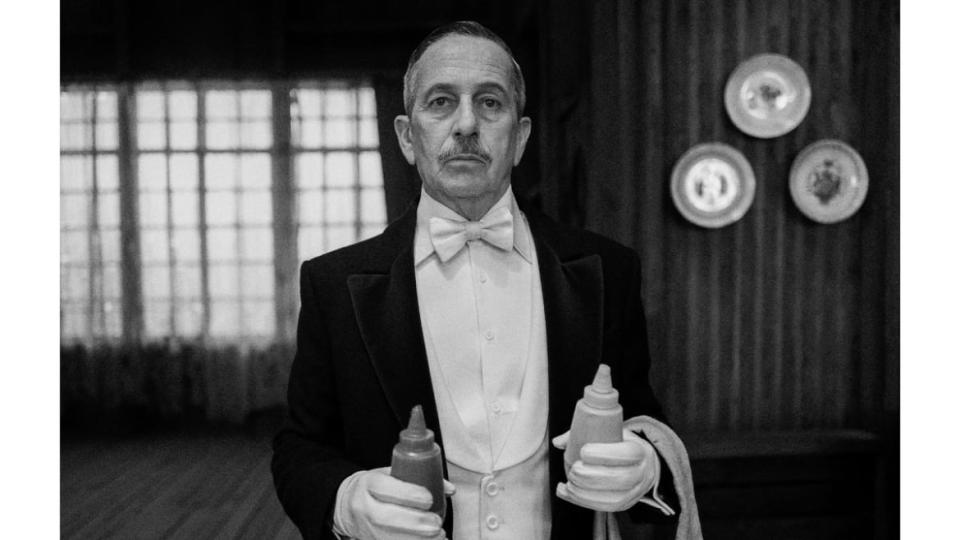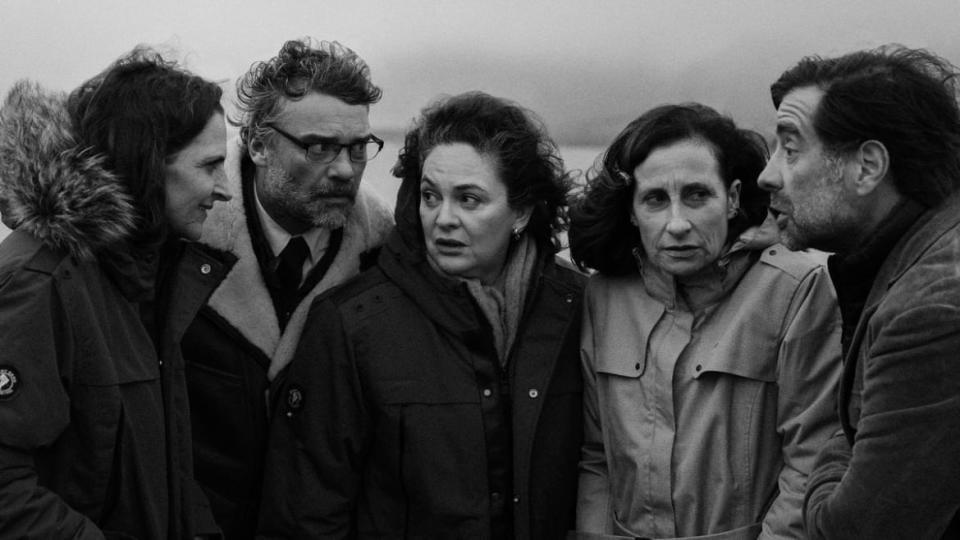Pablo Larraín’s ‘El Conde’ Imagines If Chilean Dictator Pinochet Was a Vampire

- Oops!Something went wrong.Please try again later.
- Oops!Something went wrong.Please try again later.
- Oops!Something went wrong.Please try again later.
- Oops!Something went wrong.Please try again later.
- Oops!Something went wrong.Please try again later.
Pablo Larraín is best known stateside for his biopics about famous 20th-century women: Jackie, Spencer, and the forthcoming Maria starring Angelina Jolie as acclaimed opera singer Maria Callas. Nonetheless, his finest works are those that grapple with tumultuous life in his native Chile under the dictatorial rule of Augusto Pinochet: Tony Manero (2008), Post Mortem (2010) and No (2012). As also demonstrated by 2015’s The Club, Larraín seems most assured when tackling the corrosive effects of personal and national traumas, and it’s that subject which he again revisits in El Conde (“The Count”)—this time, with a satiric streak that’s as bleak as its monster.
Co-written with The Club and Neruda screenwriter Guillermo Calderón, El Conde (premiering at the Venice International Film Festival before debuting on Netflix on September 15) is a black-and-white genre hybrid that imagines an alternate reality in which Pinochet (Jaime Vadell) is not only a figurative embodiment of evil, but a literal one as well. That’s because in its story’s universe, the Chilean dictator—who passed away in 1990—is a 250-year-old vampire residing on the outskirts of Santiago.
Yet if he’s still alive (or, at least, undead), he now longs for the permanent grave due to his country turning its back on him, after four decades of rule, for his crimes and corruption. Residing with his wife Lucía (Gloria Münchmeyer) and his servant Fyodor (Alfredo Castro), he’s a husk of his former self, reduced to sitting around his barren house and attendant ranch facilities, despondent over his current state and the fact that he doesn’t have the will to bring it to an enduring end.
El Conde is narrated in English by a woman whose identity is part of its central cynical joke: namely, that wickedness is eternal, reborn over and over again in different guises, and in various parts of the world, to wreak havoc on the pure, decent, and innocent. It’s a worldview as desolate as the mist-enshrouded landscape that this Pinochet inhabits, keeping himself upright and conscious by feeding off the stash of frozen hearts stored in the basement lair beneath his barn.
Marked by austere wooden structures and a solitary guillotine that Fyodor uses to remove horses’ and pigs’ heads from their bodies, it’s a domicile fit for a creature of the night. At tale’s outset, though, it comes across as more of a prison for Pinochet, who takes to the night skies in his iconic military uniform, his cape fluttering in the wind like a bat’s wings, in order to prey upon those in the nearby metropolis. There, he cuts out victims’ hearts with a knife, sticks them in a blender, and consumes them in glasses that—in one of the film’s signature sights—he leaves at the scenes of his crimes, their sides streaked with pieces of artery residue.
Partnering with frequent Todd Haynes cinematographer Edward Lachman, Larraín shoots El Conde in sumptuous monochromatic hues and with a premium on silhouettes, panoramic pans, and overhead shots that suggest heavenly judgment. Its digital-smooth visuals aren’t gritty enough to warrant comparisons to Nosferatu, but they cast a suitably chilly pall.
Augmenting that mood is a not-inconsiderable amount of gore, be it fatal stabbings and grisly decapitations or the messy consumption of organs and bodily fluids, all of which speaks to its protagonist’s ghastliness. Given that he instinctively feeds on humans, it’s little wonder that Vadell’s crusty dictator shrugs off the hundreds (if not thousands) of political killings he ordered; of greater concern to him, amusingly, is being called a thief, since it suggests he wasn’t entitled to the riches made available by his presidential office.

Pinochet’s compound is only accessible by crossing a River Styx-like body of water in a boat dubbed the Ark, and El Conde’s saga concerns two sets of unexpected visitors. First are the aged man’s five children, who know their father’s unholy secret and clamor for his wealth (supposedly contained in his stash of secret documents). The second is Carmencita (Paula Luchsinger Escobar), a young, devout nun who’s summoned by a Pinochet daughter to the house in order to pose as an accountant while endeavoring to free the man from his demonic possession.
Twisted revelations and bumbling double-crosses follow, from flashbacks that detail Pinochet’s initial discovery of his condition as an anti-revolutionary soldier in King Louis XVI’s army, to balletic flights through the perpetually gray, cloudy sky, to a bevy of romantic affairs and nefarious schemes in which everyone seeks to maintain or enhance their position at this decrepit court.
Larraín recognizes that the real-life Pinochet was a fiend with few historical equals, and thus El Conde’s depiction of him as a Dracula-ish beast resonates as a grimly funny gag. The film plays like a cross between a horror movie, Succession, and The Death of Stalin, with its characters’ immortality, self-interest and ruthlessness only matched by their idiocy—well, all of them save for Pinochet himself, who over the course of this affair gets a new lease on life courtesy of an unexpectedly amorous relationship that complicates the competing plots being hatched against him.

It’s too bad that Larraín and Calderón don’t lean a tad further into absurdity; the material is occasionally in need of an additional jolt of outlandish comedy to help sell its primary (and, to some extent, thin) conceit. Still, the action’s overarching harshness serves as its own form of humor, never better than when Carmencita interviews the grown Pinochet kids and praises their heinous misdeeds (including profiting off terrorism) with a sarcasm that they, full of pride and entitlement, completely miss.
El Conde is simultaneously Larraín’s most direct and fanciful attempt yet to grapple with Pinochet and the wreckage he wrought, aided by excellent turns from Vadell as the mundanely malevolent cretin and Escobar as his polar-opposite opponent (who, in a late close-up, starkly resembles Renée Falconetti’s Joan of Arc). Ultimately, it conveys little that wasn’t already covered by the director’s prior films about the dictator’s reign. However, it remains a stylishly pessimistic portrait of one man’s villainy and, just as stingingly, the way in which it infected all that he touched—as if through the very blood.
Liked this review? Sign up to get our weekly See Skip newsletter every Tuesday and find out what new shows and movies are worth watching, and which aren’t.
Get the Daily Beast's biggest scoops and scandals delivered right to your inbox. Sign up now.
Stay informed and gain unlimited access to the Daily Beast's unmatched reporting. Subscribe now.

